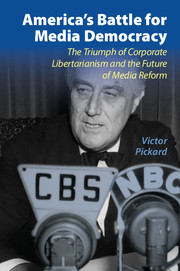 America's Battle for Media Democracy
America's Battle for Media Democracy Book contents
- Frontmatter
- Contents
- Acknowledgments
- Introduction
- 1 The Revolt against Radio
- 2 A Progressive Turn at the FCC
- 3 The Battle of the Blue Book
- 4 The Origins of the Fairness Doctrine
- 5 The 1940s Newspaper Crisis and the Birth of the Hutchins Commission
- 6 Should the Giants Be Slain or Persuaded to Be Good?
- 7 The Postwar Settlement for American Media
- Conclusion
- Bibliography of Primary Sources
- Index
- References
5 - The 1940s Newspaper Crisis and the Birth of the Hutchins Commission
Published online by Cambridge University Press: 05 October 2014
- Frontmatter
- Contents
- Acknowledgments
- Introduction
- 1 The Revolt against Radio
- 2 A Progressive Turn at the FCC
- 3 The Battle of the Blue Book
- 4 The Origins of the Fairness Doctrine
- 5 The 1940s Newspaper Crisis and the Birth of the Hutchins Commission
- 6 Should the Giants Be Slain or Persuaded to Be Good?
- 7 The Postwar Settlement for American Media
- Conclusion
- Bibliography of Primary Sources
- Index
- References
Summary
The 1940s held multiple challenges for American print news media. Newspapers in particular came under withering criticism, and the need for press reform was becoming a matter of public consensus. “It is a fact,” stated a 1946 editorial in Editor & Publisher, the leading trade magazine, “that newspapers in general have become the national whipping boy.” A later piece described how 1947 had subjected newspapers “to the most searching analysis and criticism in all their history.” Similar sentiments were shared across a wide range of opinion magazines, trade journals, and journalists’ firsthand accounts. Media criticism, according to one historian of the period, had become a kind of popular sport. Critiques that previously had been associated with fringe polemics and leftist elements within the labor movement were becoming mainstreamed. Radicals such as Morris Ernst, who advocated breaking up newspaper and broadcasting chains, had begun to significantly influence media policy discourse. Political elites and broad sectors of the public were increasingly cohering around a structural critique of their press system.
Among the main causes of distrust of the industry were increased concentration of ownership and decreased competition. Charges against newspaper monopolies, absentee ownership, and lack of accountability to local communities became commonplace. As press institutions fought for their very legitimacy, calls for government intervention prompted warnings from people both within and outside the industry that the press must shape up before it was too late. Reformist innovations like citizen councils, proposed by the industry to confront the “rising tide of dissatisfaction,” gained traction – if only to prevent further public criticism and possible government action. Indeed, the government was already encroaching on multiple fronts, and such interventionist moves put publishers on notice that they were fair game for regulation.
- Type
- Chapter
- Information
- America's Battle for Media DemocracyThe Triumph of Corporate Libertarianism and the Future of Media Reform, pp. 124 - 151Publisher: Cambridge University PressPrint publication year: 2014


